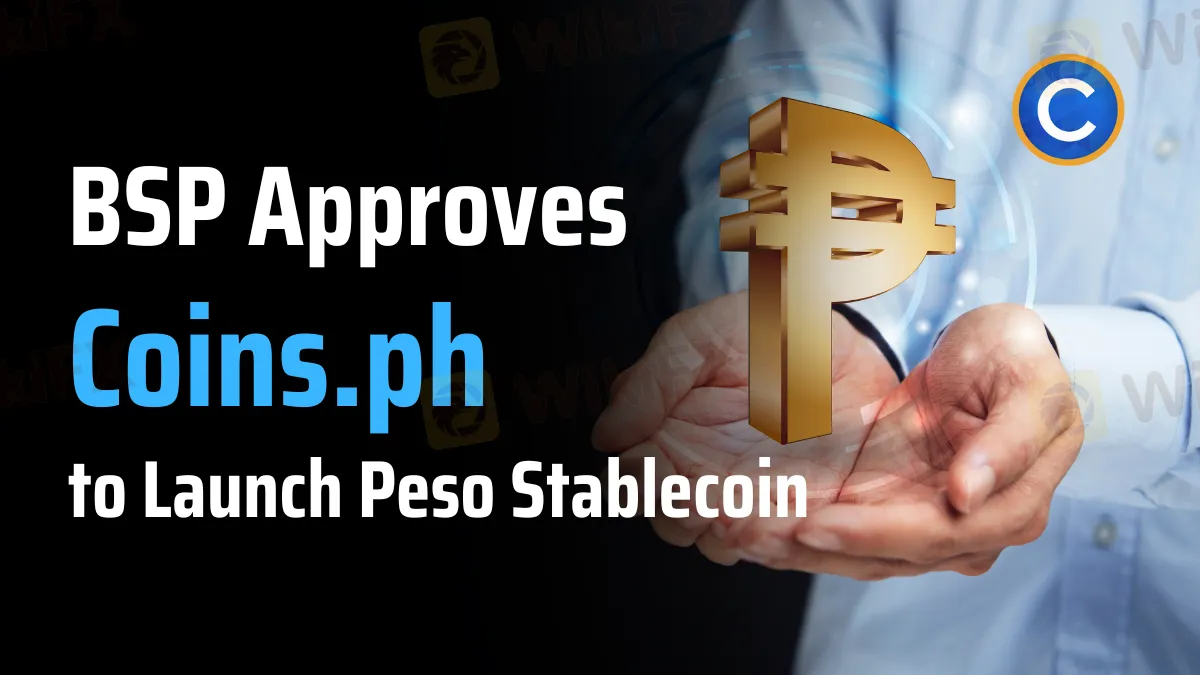简体中文
繁體中文
English
Pусский
日本語
ภาษาไทย
Tiếng Việt
Bahasa Indonesia
Español
हिन्दी
Filippiiniläinen
Français
Deutsch
Português
Türkçe
한국어
العربية
BSP Approves Coins.ph to Launch Peso Stablecoin
Abstract:In the Philippines, Coins.ph receives BSP approval for PHPC, a peso-backed stablecoin, launching in June for peer-to-peer transactions.

Coins.ph has received approval from the Bangko Sentral ng Pilipinas (BSP) to launch PHPC, a stablecoin backed by the Philippine peso, marking a key milestone for the country's financial technology industry. The launch of this cutting-edge digital currency on the Coins.ph platform in early June will be a watershed moment in the country's digital transformation of financial transactions.
Wei Zhou, the CEO of Coins.ph, made the news during a Taguig City press conference. Zhou emphasized that after starting the procedure in the first quarter of the year, the business got BSP clearance for a sandbox in April. It will take two to three months to complete the sandbox, a regulatory framework for evaluating innovative financial innovations. Coins.ph wants to achieve certain KPIs and incorporate 20,000–30,000 users into the system in this time frame.

PHPC can change the Philippines' financial sector. It is 1:1 pegged to the Philippine peso and backed by cash and currency equivalents kept in local bank accounts, ensuring stability. This agreement will provide users with access to a stable and trustworthy digital currency, ensuring that each PHPC is equivalent to one real peso.
Its launch is significant because PHPC is the first peso-backed stablecoin that is usable for retail purposes. It supports both peer-to-peer transactions and business-to-business contacts. This broad variety of possible applications indicates a substantial shift in the way digital transactions are conducted, from traditional banking hours to a more dynamic, round-the-clock financial interaction paradigm.
Remittances are an important source of income for many Filipinos, thus, Zhou predicts that this will be one of PHPC's main uses. “PHPC is expected to lower the costs and barriers for sending money back home,” Zhou said. “Moreover, it enables real-time transactions at any time of the day, significantly enhancing the efficiency of financial transfers.”
The BSP-supervised launch of PHPC by Coins.ph is a significant development as the Philippines' financial industry embraces digital innovation. It is compatible with the global trend toward more linked and real-time financial systems, as well as the growing trend toward digitalization. PHPC is expected to play a significant role in the Philippines' digital financial environment because of its capacity to revolutionize a variety of financial operations, including trading, payments, and remittances.

Disclaimer:
The views in this article only represent the author's personal views, and do not constitute investment advice on this platform. This platform does not guarantee the accuracy, completeness and timeliness of the information in the article, and will not be liable for any loss caused by the use of or reliance on the information in the article.
Read more

PayPal Expands PYUSD Transfers to Ethereum and Solana
PayPal's PYUSD stablecoin can now transfer across Ethereum and Solana, enhancing flexibility for users through a LayerZero cross-chain integration.

Robinhood Reinstates SOL and ADA Amid Expanding Crypto Offerings
Robinhood brings back SOL and ADA for U.S. investors after delisting due to SEC concerns, adding XRP and PEPE in an expanded lineup of 19 cryptocurrencies.

Capital.com Shifts to Regional Leadership as CEO Kypros Zoumidou Steps Down
Capital.com transitions to a regional leadership model as Kypros Zoumidou steps down, promoting Christoforos Soutzis as CEO of its Cyprus operations.

Revolut X Expands Crypto Exchange Across Europe, Targeting Pro Traders
Revolut X launches across 30 EEA markets, giving users access to over 200 cryptocurrencies, with advanced tools and competitive fees for experienced traders.
WikiFX Broker
Latest News
JUST Finance and UBX Launch Multi-Currency Stablecoin Exchange
XM Revamps Website with Sleek Design and App Focus
TradingView & Mexico’s Uni. Partnership, to Enhance Financial Education
Something You Need to Know About SogoTrade
Global Shift in Cryptocurrency Taxation: Italy and Denmark Chart New Paths
Webull Introduces 24/5 Overnight Trading to Extend U.S. Market Access
eToro Launches Global-Edge Smart Portfolio: A Balanced Approach to Growth and Stability
Darwinex advises traders to update MT4 & 5
Revolut X Expands Crypto Exchange Across Europe, Targeting Pro Traders
Crypto Scammer Pleads Guilty in $73 Million “Pig Butchering” Fraud
Currency Calculator


